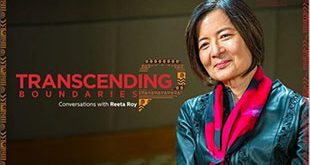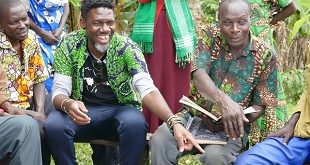
Because of the closure of schools due to the pandemic, lessons are being done on television, radio, and online instead of face-to-face. Learners with visual impairment say both methods do not favor them
Gulu, Uganda | CAROLINE AYUGI | For learners with visual impairment in Uganda, preparing for a dream career means revising old braille notes, past examination papers, and donated braille Bibles.
“I got this Bible from the Bible Society. These Bibles are very big. They are in six boxes, some are in the cupboard and others are in a bag,” says Martin Daniel Ogenrwot, a primary four pupil of Gulu Primary, a blind-inclusive school.
Because braille papers are thick and bulky, each of the 73 books in the Bible is brailed and laminated as a single book. But to keep him busy during the covid-19 lockdown, 9-year-old Martin’s parents have sacrificed a huge space in their tiny, grass-thatched hut, to keep the Bible splits.
Due to the closure of schools to contain the pandemic, lessons are being done on television, radio, and online instead of face-to-face. But learners with visual impairment say both methods do not favor them.
Ogenrwot wants to become a lawyer, so he wishes he could get digital learning aids to enable him to study well. He says his parents cannot afford to let him study online and that the radio lessons also don’t give him a chance to ask questions, because that means making a phone call to the radio.
“Nowadays they are using the internet and WhatsApp to teach but we can’t afford that one. If the talking computer is there, we can use it. The radio teachers don’t give enough time. If you want to ask a question, you have to struggle to enter the [call-in] line. Sometimes, you can’t enter even,” says Ogenrwot.
Ogenrwot says the government should give a computer to each learner with visual impairment so that when they join secondary school, they don’t struggle to use it.
Lucy Akech, Ogenrwot’s mother, is a peasant farmer. Sometimes, she buys reading materials that are inserted and sold with newspapers and read for him. This method of acquiring new information she says requires a child to have unmatched listening, visualization, and memorization skills.
“But many people here are illiterate. That means looking for someone who can read to help,” says Akech.
“The writing materials are expensive for me. The braille notes are always left at school because it is government property. The only materials they are given are their past examination papers.”
Each family member in homes that have children living with a disability live on less than $1.9 (UGX 2,400 per day) and spend 31 percent more on other education-related costs, than families of children without disabilities. This is according to the 2020 situational Analysis of Persons with Disabilities in Uganda by the Ministry of Gender Labour and Social Development.
As a result, Akech says, Ogenrwot constantly reads the Bible which only helps him improve his command of the English language.
“He can hardly access new knowledge. With this kind of learning, only a child born intelligent can get meaningful examination results.”
Angelo Peter Olaka, is an orphan who is cared for by St. Phillip’s Cathedral, a local church near Gulu Primary, which is also Angelo’s school. At 17 years, Olaka is still in primary four, yet his agemates are a year away from joining University.
Olaka wants to become a cleric, and also spends most of the time reading the braille Bible that he borrowed from School.
“God has helped me a lot so the only way I can pay him back is to serve him. Unfortunately, I cannot keep this bible forever. I have to return it,” says Angelo.
“I’m not learning anything new. Even if they bring learning materials, I cannot read them because the print is not brailled. I wish the government could give us computers because it makes things easy.” [ TO PAGE 2 ]
 The Independent Uganda: You get the Truth we Pay the Price
The Independent Uganda: You get the Truth we Pay the Price


fantastic points altogether, you just received a new reader.
What might you suggest about your put up that you just made some days ago?
Any positive?